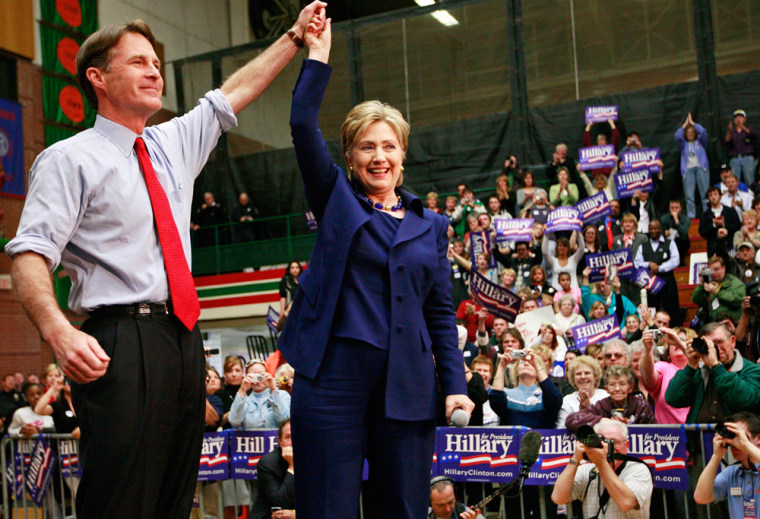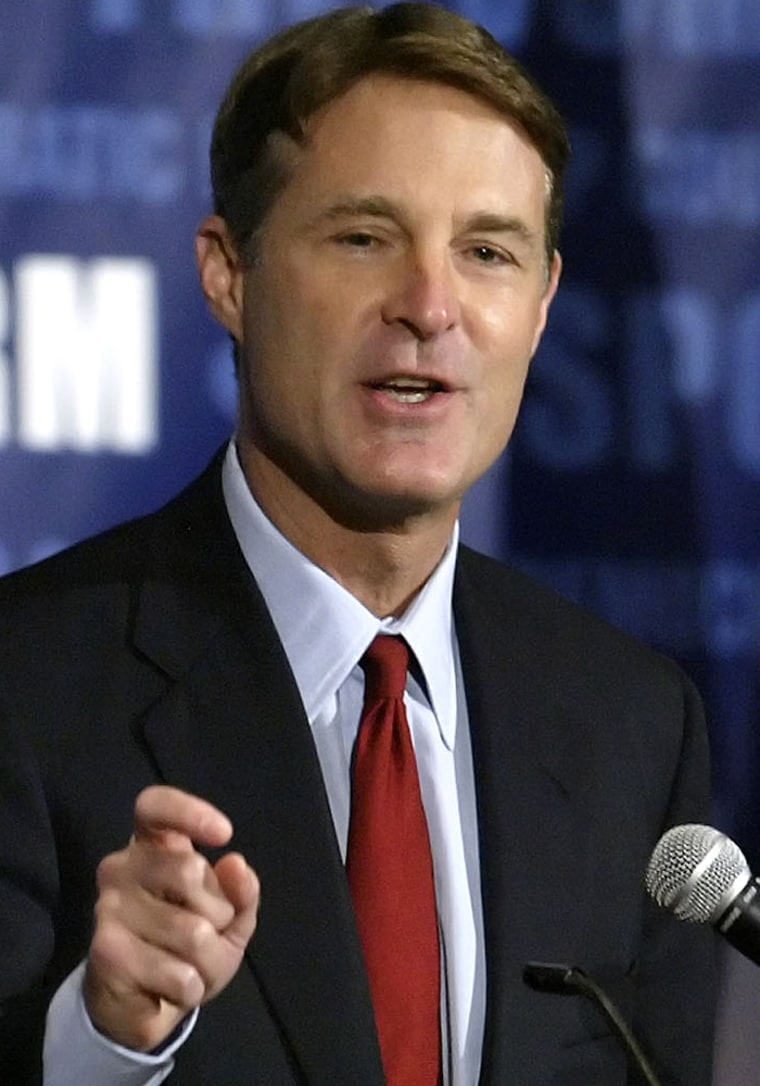National Journal's Linda Douglass sat down with Sen. Evan Bayh, D-Ind., for the May 2 edition of "National Journal On Air." This is a transcript of their conversation.
Linda Douglass: I want to introduce Senator Evan Bayh of Indiana, a Democrat and one of the most important supporters of Hillary Clinton throughout the campaign, and certainly in Indiana. Welcome, Senator.
Sen. Evan Bayh: Thank you, Linda. Good to be with you.
Douglass: Well, thanks so much for joining us. So, why do you think that Hillary Clinton is going to win in Indiana? She wasn't leading in the polls until recently.
Bayh: Well, that's right. She started behind in our state for a number of reasons. I mean, first, Senator Obama is a very gifted person and a formidable campaigner. Secondly, he's from next door, and so he has something of a home-field advantage, because about 25 percent of Democrats in Indiana, Linda, are in the Chicago media market.
So he's a very familiar person for them, but look -– she's campaigned very vigorously and I think, more than anything, her focus on middle-class, kitchen table, bread-and-butter issues -- jobs, cost of health care and gasoline, college affordability, pension insecurity, those kinds of things -- our economy is not as good as it needs to be in Indiana, and so her focus on what we can do about those economic anxieties I think has served her well.
And the polls have reflected that. She went from behind eight, to behind four, to behind three; now it's dead even. I think she may have a little momentum. But the next five days are going to tell you. Our state is a basketball-crazy state, Linda, and as we would say in Indiana, this is just a jump-ball.
Douglass: But you think she does have the momentum?
Bayh: Yeah, I think if I had to guess, she's got momentum. But there are some other things that make our state a little bit different. Our rules -- this is important -- our rules are different than Pennsylvania, for example, where she won by nine or ten. They only allow Democrats to vote in Pennsylvania. If it were just Democrats in Indiana, she would win by that much or maybe more. But we allow non-Democrats to participate in choosing our nominees in Indiana, and Senator Obama tends to do a little better among those people, and that makes the race closer.
Douglass: Let's talk a little bit about the Senator's proposal for a gas tax holiday, which has sparked a lot of controversy with many, many economic experts saying it's not a good idea, it will only save consumers about $30 over the summer; it could drive up the price of gasoline, they say, because it would drive up the demand for gasoline, it will help the oil companies make more money and it will take money away from highway repairs. Those were all the arguments that were made by many, many economic experts that one has been reading over the last couple of days. Why do you think this is a good idea?

Bayh: Well, many middle-class families, Linda, are struggling. And while $30 is not a great amount of money in the great scheme of things, at least it is something. And, look, we need both a long-term solution -- which is the most important thing -- but also, if there's some things than can be done in the short term to provide a little relief, I think we ought to do that.
And that's -- look, she does not agree with John McCain, who wants to suspend the gas tax and then not pay for it and drive up the deficit. She wants to pay for her proposal by having an excess-profits tax on the oil companies who are making, you know, record profits because of the artificially high price of oil. Senator Obama, of course, disagrees with that and does not want to suspend the gas tax, so basically we would do nothing in the short run.
Now in the long run, she believes we have to switch to higher-efficiency vehicles, get more miles per gallon, alternative fuels like biofuels. We got a problem with the price of food today on that, but we can switch to more efficient ways to produce biofuels that don't drive up the price of gasoline and, in the long run, move to electric vehicles, hydrogen vehicles, and those kinds of things that use much, much less oil. So the bottom line is, we need to look at this both in the short term and in the long term, and I guess the economists are going to look at those middle-class families and just say, well, we're not going to do anything for you. During these tough times, she favors doing something rather than nothing.
Douglass: So the Obama campaign has clearly suffered this week from yet another eruption of controversy surrounding Reverend [Jeremiah] Wright. Hillary Clinton said on the O'Reilly show on FOX yesterday that she was glad he finally distanced himself from Reverend Wright. Do you agree with her suggestion that he waited too long?
Bayh: Well, I'll leave that up to Senator Obama. Look, I think it's good that he came out and separated himself very clearly. We all believe, Senator Obama included, that Reverend Wright's comments were just way out of bounds. And so I hope that his statements will allow us to refocus on the things that I think matter most to the people in my state, and that's those bread-and-butter economic issues. You know, folks are struggling in real ways, and they want tangible progress in their daily lives. And these controversies of the day, while it's understandable they get a lot of attention, ultimately don't affect people's daily lives. And so that's what we need to focus on, and I hope his statement will allow us to do that.
Douglass: One of the matters that the superdelegates certainly are considering is which of the candidates is going to be the most electable when running against John McCain in the general election. And the Obama campaign often points to the fact that Hillary Clinton has got very high negatives in the polls that have been taken recently -- that a majority of people have an unfavorable view of her. What about that argument? Is that a vulnerability for her?
Bayh: Well, these polls come and go, and there were a bunch more out today and it looked to me like the positives and negatives for Senator Clinton and Senator Obama were roughly equal. And the question is not where we are today, but where we're going to be. And unfortunately, I think that people on the far right and those who advise them, like Karl Rove, are going to look at this and conclude the only chance they have of winning, which is, of course, what they mainly care about, is to basically disqualify our nominee.
People don't like the direction of the country today. They don't approve of the job performance of our current president. And they are going to look more favorably upon either of our nominees. So regrettably, and I say this with sadness, but I just think it's an expression of reality -- they are going to attack, attack, attack. And the result of that is going to be -- we have got to look at who is strongest of our two candidates, who is going to be more resilient in standing up to those things. They'll attack Hillary, too, no question about it, but people already have a pretty fixed opinion of her. Barack's challenge is, when you are new, when people don't know you very well, the other side has a greater opportunity to kind of fill in those blanks in a way that is potentially harmful to you.
Douglass: So you think he'd be more vulnerable, then, to those kinds of attacks than she would?
Bayh: Well, I think it's something they're going to have to address if he is the nominee. And look, if he is, I'll support him wholeheartedly. But I think it's just a question of reality -- they'll attack her, too. And she's got some weaknesses they'll try to exploit, too. I just think that most of that is already known. People have an opinion about that, and so there's less possibility of movement there in a negative direction, and I think he may be a little more vulnerable, not because he's a bad person, but just because he's new and people don't know as much about him.
Douglass: Well, thank you so much, Senator Evan Bayh of Indiana, strong supporter of Hillary Clinton. We look forward to talking to you again, perhaps after the Indiana primary.
Bayh: I'll look forward to it, Linda.
Douglass: Thanks so much, Senator.
Bayh: Bye-bye.
